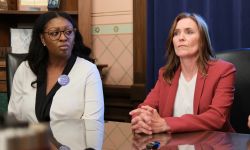Opinion | Personalized learning is critical to Michigan student success
“Can I.. bathroom?” six-year-old Abdo asked on the first day of school.
In the days that followed, I noticed that Abdo, a first grader, would often stop, open doors, and look inside as our class walked down the hallways. After talking with his parents, I learned this was Abdo’s first year in a U.S. school, that he had spent the last year in Sudan, and that at home they didn’t speak English. I asked his older brother where Abdo learned the English words he was using in class. “Youtube!” He said matter of factly.

At first I worried about Abdo — whose name has been changed for this column to protect his privacy — and his progress, given that the Montessori school where I work does not have a large English Learner population or specific support staff for them.
I soon discovered that because of the personalized learning approach the Montessori uses, I could do more for Abdo’s learning than I ever thought I could. I had previously taught at district public schools. Just one year as a public Montessori teacher has radically changed the way that I set up my classroom environment and how I approach accelerating student learning across the country.
My current classroom is built upon personalized learning through independent exploration and student choice, two things that are central to the Montessori method. My students choose how they want to practice academic content and the timing of the work they do throughout the day, while I pull them into small groups to focus on skills and lessons across academic areas.
In my classroom, I also place more emphasis on students self-regulating when it comes to managing their time and completing tasks. As Abdo moved through the year, I was able to gradually increase the level of difficulty of his work and watch his confidence increase with every concept he mastered.
He started off the year practicing how to correctly hold a pencil and do basic number formation. As the year progressed, he moved up to multi-digit addition as he developed a deeper understanding of numbers and equations. “Easy peasy, lemon squeezy,” I heard him saying to a friend as he tackled a skip-counting task on a number chain.
Abdo taught me how much of a difference individualized education can make. If we truly want to create invested learners at every level, then we have to commit to creating classrooms that are more personalized towards their needs.
Too often, our districts prescribe small groups as the way of lifting students to greater academic heights, but add the caveat that each group must be less than 15 minutes and all other content must be on level, no matter the student’s abilities. With Covid-era funds running out in most districts, the large-scale tutoring that was prescribed by many has not yet made a large impact and now there is no funding left for it to continue.
However, with national NAEP testing scores still trending downward, schools must find new ways of reaching students where they are at so that they can soar to the heights of which they are capable.
In a recent survey of 2000 high school teachers, 86 percent believe in personalized learning, while seven-in-10 agree that a one-size-fits-all curriculum is a thing of the past. This may mean many popular teaching practices in my district and across Michigan will have to adapt, but if we want all learners to thrive, then adapt we must.
If we want our NEAP scores to reflect the brilliance that we know our children to be capable of, then we must commit to programs that provide consistent small group tutoring as well as expand opportunities for individualized learning in the classroom through a de-emphasis of whole group learning for every subject.
Change starts with one classroom at a time, with teachers like me seeing how becoming more attuned to the individualized needs of each student can result in huge payoffs in their learning. I can’t guarantee that it will be easy peasy, lemon squeezy, but I know that the reward will be worth it.
See what new members are saying about why they donated to Bridge Michigan:
- “In order for this information to be accurate and unbiased it must be underwritten by its readers, not by special interests.” - Larry S.
- “Not many other media sources report on the topics Bridge does.” - Susan B.
- “Your journalism is outstanding and rare these days.” - Mark S.
If you want to ensure the future of nonpartisan, nonprofit Michigan journalism, please become a member today. You, too, will be asked why you donated and maybe we'll feature your quote next time!




